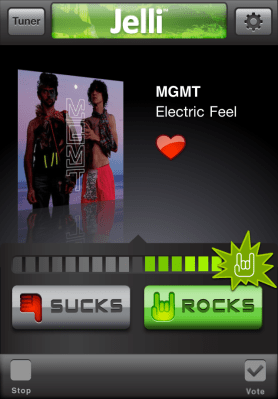Jelli, the radio startup offering local stations tools that allow their listener base to control the music selection and playlists, has just been awarded a patent on the concept of user-controlled broadcasting. The patent (U.S. Patent No. 8,392,206) is dubbed “Social Broadcasting User Experience,” and refers to a range of methods related to audience participation with a one-to-many transmission, regardless of the transmission method.
According to Jelli CEO Michael Dougherty, the patent was filed a long time ago – back in 2007, as a provisional patent – before the startup had even launched. In 2008, Jelli submitted a full patent filing, which was actually part of several patents the company filed around this and similar concepts the team has invented.
“We always thought it was a big idea to combine the reach of broadcast with the engagement of the web,” says Dougherty.
The patent broadly covers “the concepts and user interaction methods around audiences engaging with one-to-many ‘broadcasts,’ whether they be defined as radio, TV, in-venue, etc., or delivered via streaming, terrestrial, caching, cable, satellite, etc.,” Dougherty tells us. “It also covers many methods and UI examples of how the audiences can socially engage,” he adds. This includes playlist voting, algorithms to determine what is chosen next, a rock meter, Jelli’s own “rocket” design, game mechanics, social attribution, and various access methods.
For background, Jelli first launched its service in 2009, calling itself a “Digg for streaming music,” which referenced the way it allowed users to vote up or down the tracks they wanted to hear. Unlike Pandora, which focuses on delivering personalized radio stations for individuals, Jelli brings a listener base together to collaboratively vote on the music they want to hear using crowdsourcing techniques.
The company raised an additional $9 million in funding this past October, in a round led by new investors Intel Capital and Relay Ventures, and which saw participation from existing investor First Round Capital, as well as individuals like Roger Ames, former Chairman of EMI Music. At the time, the company reported that 70 radio stations across the U.S. were now using its technology to crowdsource their music selections, which was up from the 20 partnerships it had as of March 2012.
Jelli then announced this February that it had signed a deal with Entercom, bringing its total platform reach to 23.5 million weekly listeners across 175+ radio stations and 80+ cities. It now reports serving more than 2 billion ad impressions annually. (The startup had previously reported 60 million terrestrial radio spot impressions per month as of last fall). Also for comparison’s sake, the 23.5 million listeners metric was a big jump up from the 650,000 it had previously announced in May 2012.
Dougherty declined to comment on how Jelli would proceed with licensing or enforcing the patent now that it’s been granted, but it’s worth noting that the company is not alone in building out tools for listener-controlled radio. LDR Interactive, for example, offers a white-labelled solution of sorts, which Cox Media recently began experimenting with here in the U.S. LDR has also built similar “crowdcasting” solutions for more than 150 stations worldwide.
